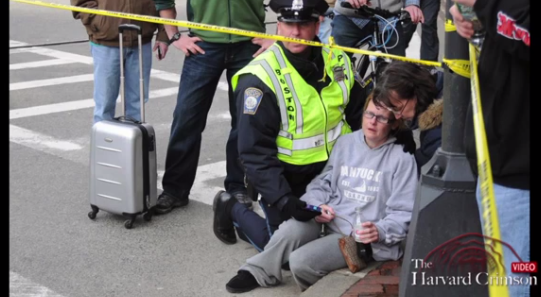{shortcode-55741b47ba2dee14213bcedda11130cefa9821da}
UPDATED: April 15, 2014, at 8:30
This is the first in a weeklong series of articles chronicling Harvard’s remembrance of the Boston Marathon Bombings that occured a year ago.
For the Harvard affiliates running in last year’s Boston Marathon, it was a picture-perfect mid-April morning and a pleasant, if difficult, run through Boston’s suburbs.
“It was a beautiful day, and it was a great run,” Patrick Rooney ’14 remembered in an interview last week. “It was just a really incredible run. And I think people forget that, for good reason, but it was a really beautiful day.”
Rooney was one of dozens of affiliates who had crossed into Boston to take part in one of the area’s most treasured spring traditions. Many ran, and countless others watched and cheered along the 26.2 mile course from Hopkinton to Back Bay’s Copley Square.
And then, shortly before 2:50 p.m., just yards from the Boylston St. finish line, two homemade explosive devices detonated within seconds of each other, injuring hundreds on the spot and eventually killing three.
Rooney, who was just blocks away from the finish when the bombs went off, said that he didn’t know what was happening at first. Neither did those across the river, rushing through their end-of-term Monday schedules, who heard the news in fragmented spurts of short breaking reports and social media postings.
“[It was] kind of an earthquake feeling, turning around and seeing the first one,” Rooney said. “And then the second one happened a few seconds later.... It was a very localized thing around those two blasts. I think people that were at the finish line and people that were maybe a block away...could see everything, could hear everything.”
But further up the course, those who were still running—many without cell phones or any communication devices—remained in the dark. Sara R. Siskind ’14, a Crimson editorial editor, had entered the race unofficially a few miles in to help pace a friend.
“This race official or policeman, I don’t remember, stopped me,” Siskind said in an interview last week. “I just remember thinking, ‘You don’t know. I’m running the Boston Marathon. You don’t just tell me to stop.’”
But the runners had to stop. With hundreds injured on Boylston street, with the finish line cluttered with debris and medical personnel, the race could not go on. The unfinished race left thousands of runners on the course with spectators and relatives wondering if their friends and loved ones were safe or not.
{shortcode-ebbe7d57d115f6a00a708598f60061ca94af7ed3}
Eventually, all of the Harvard affiliates who ran the race made it back to a campus which had experienced dozens of unfounded bomb scares and a partial evacuation of the John F. Kennedy School of Government .
Krystle Campbell, a former Business School employee whose brother and mother have also worked at the University, suffered critical injuries in the blasts. Campbell succumbed to her injuries soon thereafter, and was among three who lost their lives in the bombings.
Read more in College News
UC To Ask College To Pay for Summer Storage in Renovated Houses













